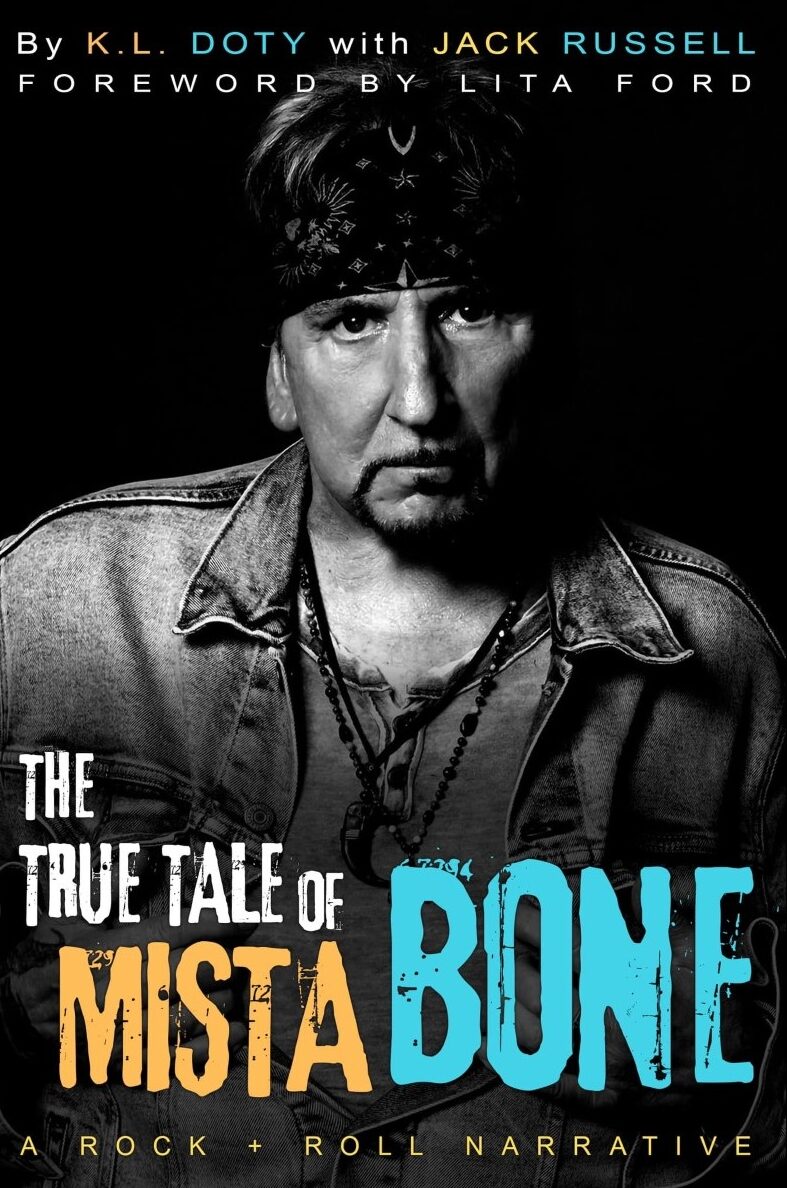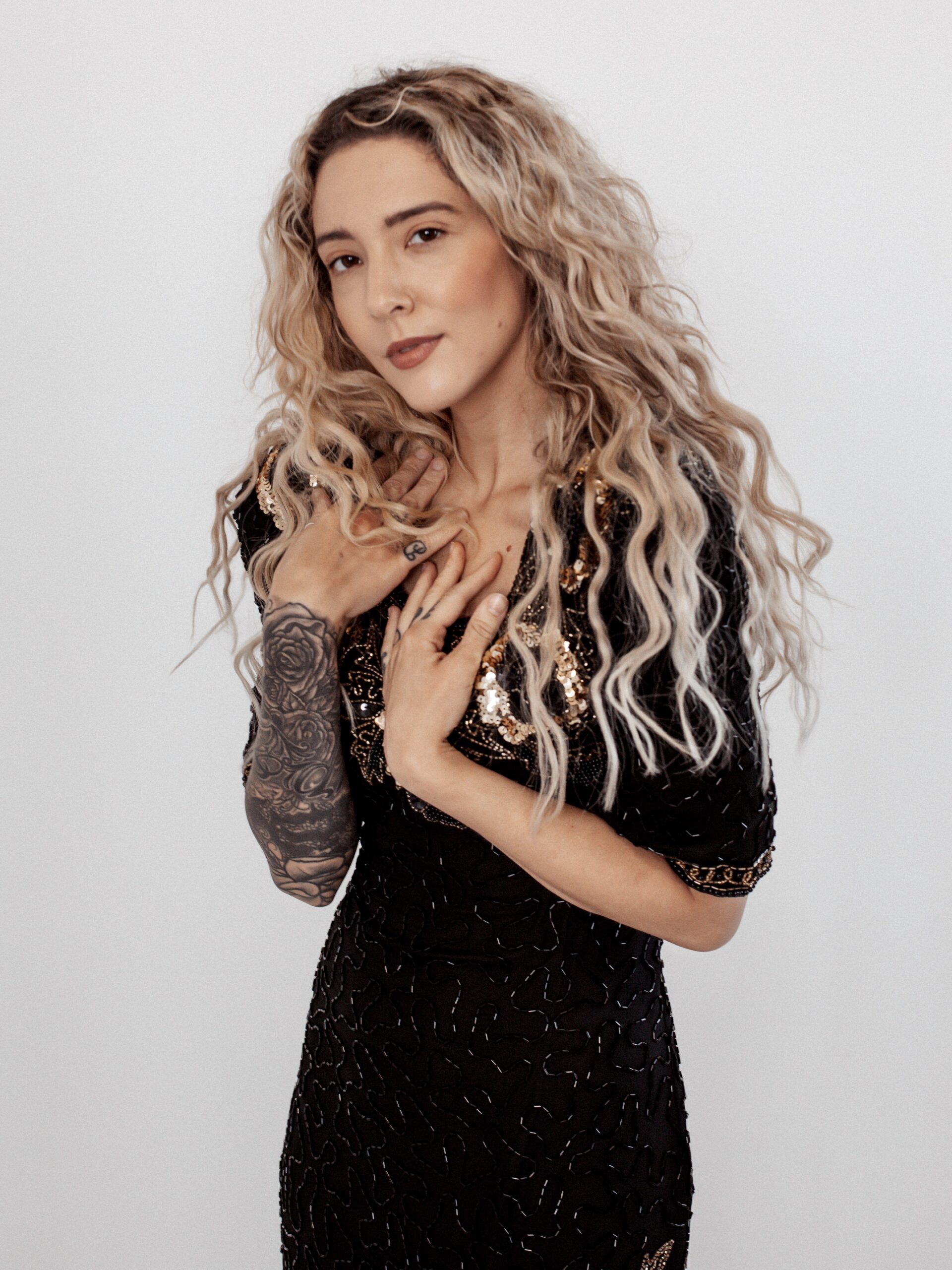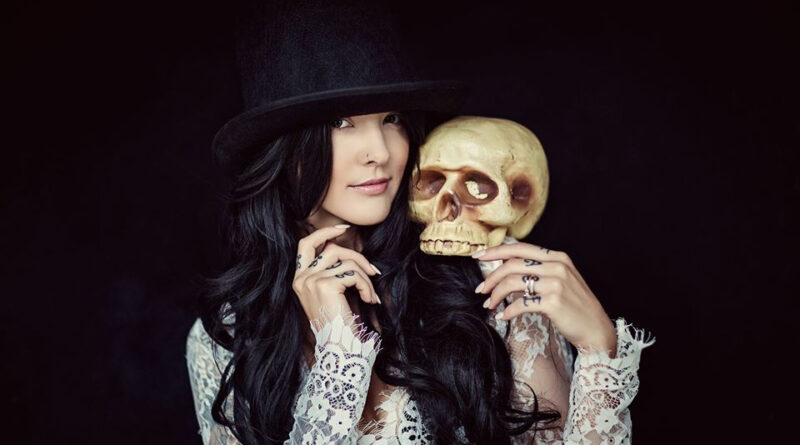A MATTER OF LIFE AND DEATH
Author K.L. Doty goes deep on the challenges of writing Jack Russell’s autobiography, “The True Tale of Mista Bone: A Rock + Roll Narrative”
BY DARREN TROMBLAY
Jack Russell was a man gifted with a talent that brought him a bit of everything in life.
Fame. As a bonafide rock star on the world’s stage, Russell, a singer by trade, loved a shining spotlight.
Money. Or a taste of it anyway. Selling millions of albums can fatten one’s bank account considerably. It did.
Things. Good things, generally. Houses, cars, or in Russell’s case, a boat.
But there’s an inherent risk to having unfettered access to things, especially in the rock n’ roll game. Drugs, namely. Tastes good going down, but the devil, as they say, always gets his due.
Such was the life of Russell, a man who was seen across the globe as the singer for Great White, the California-based band who made an indelible mark on what was the 1980s hard rock music scene. But it wasn’t Russell’s face that led he and his band to summit of the hard rock mountain; it was his voice. That instantly recognizable voice. When “Rock Me,” “Lady Red Light,” or “Save Your Love,” came on the radio, it was pure Jack, an unmistakable driving force of nature who could sing a phonebook and make it sound good.
Russell loved and lived it all — times 100. He and his band were having the time of their lives.
But as the 1980s rolled into a new decade, Great White and nearly every other hard rock band from that era found themselves on the outside looking in thanks to the arrival of the likes of Nirvana, Soundgarden and Pearl Jam. Grunge. Russell and his ilk went from touring arenas to yesterday’s news.
Challenging, for certain, but little did anyone know that this was but one of a number of larger, more formidable waves yet to come.
Stormy seas had arrived.
Russell’s inner demons didn’t help the cause. Drugs, specifically. Cracks began showing in the armor because of the actions brought on by the aforementioned. But, through it all, he still managed to maintain that secret weapon that kept him in the game — that voice.
But even that wasn’t going to save him from what was to come on that cold, infamous night in 2003 when 100 people died in a night club during a Great White performance. Russell was there. He saw it all. Those deaths would haunt him the rest of his days, he admitted.
Russell’s health woes ultimately proved insurmountable. Multiple surgeries and hospitalizations had taken a deep toll on his body through the years. Finally, on July 17, 2024, Russell announced that he was retiring from touring, disclosing that he had been diagnosed with Lewy Body Dementia (LBD), the second most common type of dementia after Alzheimer’s disease that causes a decline in mental abilities.
“I am unable to perform at the level I desire and at the level you deserve,” Russell said. “Words cannot express my gratitude for the many years of memories, love, and support.”
The Wasted Rock Ranger’s ship was nearing port. Just a few weeks later, it docked for good. Russell passed away on Aug. 7 at the age of 63.
HIS VOICE
For the past four years, best-selling author, recording artist, and jack-of-many-trades K.L. Doty has had a front row seat to all of it. In her new book, “The True Tale of Mista Bone: A Rock + Roll Narrative,” Doty details the story of Russell’s rise to fame, front to back, warts and all.

It was as much a journey for Doty as it was for Russell. Through the hundreds of hours of interviews and meetings, the two had become friends. Russell’s death, then, was more than just a footnote. Losing an acquaintance is one thing. A friend? That’s another.
“I was deeply saddened,” she said of learning of Russell’s passing.
Making things even more complex was the fact that Doty knew all along of the severity of Russell’s illness. She chose, however, to keep her friend’s condition to herself. It was the right thing to do, she thought.
“It was never anything that I could share with people,” she said. “When people would ask me to go to dinner, or spend a day hanging out, it wasn’t something I had time to do. Finishing his story was critical. Working on Jack’s book was an actual matter of life and death.”
She worked relentlessly at completing the task at hand. Finally, after submitting the manuscript to the publisher in May, a few weeks later, it became a reality. The book was finished, and it was time to show Russell.
The experience was as much of a shock as it was a relief for Doty.
”I remember showing him the book on Zoom, when I had the actual book in my hands, and he looked white as a ghost,” she said. “His hair was white, his skin was white, and he was laying down. It didn’t take a rocket scientist to know he didn’t have much time left.”
THE OPENING VERSE
The notion of a book first came about when Robby Lochner, Russell’s then-guitarist and right-hand man, approached Doty multiple times with the idea of putting the frontman’s story to paper.
Doty would have none of it.
“I said ‘no’ every time,” Doty said. “It’s such a huge undertaking. I knew that it would be a lot of work, and I wasn’t interested in giving that much of my life away at the time.”
Doty, who had been certified as a wardrobe stylist through the New York University of Art and Design, received another call in September of 2020. It was Lochner again. A conversation ensued, one that didn’t end with the usual hard “no.” But there wasn’t a “yes” in there either.
That night, Doty sat alone in the still, silent darkness of her living room. She felt something.
A calling.
“I just felt that something wasn’t right,” she said. “I changed my mind, and I said ‘yes’ the next day.”
And so it began.
Their first meeting wasn’t really their first meeting. Doty had met Russell years earlier when she accompanied her husband, Chip Z’Nuff, of Enuff Z’Nuff, on a short tour with Jack Russell’s Great White.
This time, though, Doty was in author mode, gathering, recording and writing down everything Jack Russell. For months on end. Rinse, repeat. Come back and do it again.

“We spoke on the phone for a solid four years,” Doty recalled. “For the first year, we had interview sessions that were an hour long, three times a week. The second year, it was an hour here or there. I recorded every interview. I transcribed every interview. That’s hundreds and hundreds of hours. I have carpal tunnel.”
Getting his side of his story out was something that Russell had wanted to do for some time, Doty said. Much of that, she believes, stems from being the person who bore the brunt of the blame for that infamous night of Feb. 20, 2003, when 100 people died at The Station night club in West Warwick, Rhode Island during a Great White show. Concert-goers were trapped when some first-song pyrotechnics caught fire and spread through the building quickly.
Russell, who claimed the pyrotechnics had been approved by the owners of the venue in advance of the show, has maintained his innocence over the years. For the most part, however, his voice has fallen on deaf ears. A book was, as it turns out, his final chance to set the record straight. At least his version of it.
“There were so many moving parts there, that you just can’t pin it on one person,” Doty said of the incident. “That (fire) got him a bad reputation that, honestly, he’s been trying to shake ever since. He was eager to tell the whole world, ‘Hey, this is who I really am.’ ”
A great relationship slowly formed, and it helped them both. When Russell wasn’t as verbose as Doty may have liked, she didn’t have to push and pry and poke him to get more details. At this point, she knew what he meant without him actually having to say it. She knew what was on his heart.
Getting to that point wasn’t easy, however. Not only did she have to “understand” Russell, she had to be diligent.

“Here I am, having to be someone else’s voice, so I would have to go research newsworthy events, then I had to get in touch with band and crew members and friends who might have been there at the time,” she said. “I had to compile all that information and make it sound ….. pretty. My job was to listen and to take every note. I was just taking in information. And, honestly, I have a pretty ridiculous background in rock n’ roll myself, and have stories myself that I will never tell. If he told me something outlandish, I would kind of just shake my head and go, ‘Yeah, I’ve done something similar,’ or ‘That sounds about right.’ ”
Doty proved up to the challenge. Before accepting the job, she had a decision to make. Fight or flight. Her newfound love of the sport of boxing helped make her decision.
“I recently got into boxing and am training so that I can get into the ring and fight. To hit and to take a hit,” she said. “It’s scary, but I seem to have the capacity to walk right into danger and face fears and allow myself to be scared. There’s something to be pulled from that fear. You learn more about yourself. It’s very important to face fear. It’s a blessing and a curse, and I think another area where Jack and I were a lot alike.”
Doty admittedly gravitates toward the bold. Her eagerness to face new challenges, learn and relish in the processes are the winds that fan her inner flame. Equally, she knows that when a chapter is opened, inevitably it will close, too.
Like the time in her life when she stepped away from the world of exotic dancing in the adult entertainment industry for something much bigger.
Him.
HEAVEN AND HELL
It was the summer of 2021.
Doty, who hadn’t been in a church in years, found herself in an adoration chapel somewhere in the mix and din of an always-bustling Chicago. She was seeking something.
Already struggling to deal with the loss of a 33-year-old cousin to suicide, she went inside the unfamiliar place tepidly, but with good intention. She simply wanted to pray for her lost relative.
That’s when it happened. A chapter closed, and another was opened. But this time, the “another” wasn’t just any old “another.”
It was God.
“I had an experience that I wasn’t asking for, nor looking for, that was way too real and significant to ignore,” she said.
A few days before her cousin’s tragic demise, Doty had flown to Los Angeles, California to see her husband perform. Touring with him that summer wasn’t an option. There was a book to write. Jack’s book. The break to see her husband, then, came at just the right time. Her nerves were beginning to fray.
“It was a very lonely experience,” she said of the isolation of writing the book. “I’m usually very good on my own and occupying my time when he’s on the road, but this was different. Seeing him in L.A. was special.”
The two shared time together, but it wasn’t enough, she said. Z’Nuff had to say goodbye to his wife the next morning.
She was devastated.
“When he had to leave, I was left in this beautiful suite all by myself,” she remembered emotionally. “I cried in that hotel room. I got on my knees. What was happening was this fear and worry and sorrow in my heart, thinking how lonely it would be one day to not have Chip in my life.”
On her knees, she begged God for answers.
“I wanted Him to tell me if Heaven really exists,” she said. “I wanted to hear from Him that, when we are not here anymore, that I will see him (Chip) in Heaven.”
Then came the phone call. Her father phoned to relay the horrifying news of her cousin’s death while she was in the airport en route to a return to Chicago. Doty went numb. Literally.
“I was so in shock that security had to walk me through TSA. I was numb for a few days,” she said. “I didn’t know my cousin that well, so my reaction took me by surprise.”
Back home in Chicago, Doty’s mother told her to find an adoration chapel. It wasn’t church, her mother said, just “a place where the true presence of Jesus Christ is.”
So Doty went. It was unfamiliar territory. Her first instinct was to sit in the back of the chapel, she admitted. Even with her years of being the center of attention during her previous “other” life, she wanted no part of it this time.
That is until a strange feeling came over her. She felt compelled to move to the front. So she did.
“I sat down in the front and felt like I was being choked,” she said. “I thought maybe there was a potato chip in my throat, or I was allergic to something. But I somehow had this innate understanding at that moment that it was something evil that wasn’t happy that I was in the presence of God.”
Her entire reality, she said, melted away. Suddenly she was suspended in a beautiful, quiet, soft, and airy place.
It was Him.
“I saw Him,” she said. “I was in two places at once. I was fully aware I was in the chapel, and that I had also been taken to this place. My body was grounded on Earth, but my spirit was somewhere else with God.”
Suddenly, the sadness enveloping her was gone. As was fear. And hunger. Most importantly, the sense of time.
“It was at that second that I understood that this was Heaven. This was eternity; it’s real,” she said. “The heartbreak of losing someone wasn’t there anymore.”
Doty doesn’t recall how long she was “there,” but does remember suddenly hearing people talking. Car horns. Traffic. People arguing with each other. In other words, reality. She had to go back.
“I didn’t want to go. I begged Him not to send me back,” she said. “I heard the world and didn’t want to be there. He told me that I had to. In hearing the honking, and what was behind that, God was showing me how vulnerable we are in choosing good and evil. That unruly sound of people unhappy with each other, there was nothing heavenly about that. I came back from that consciousness with a vast understanding that we are on a battlefield here on Earth. And it’s an absolute battle of good and evil.”
THE FINAL VERSE
Russell knew of Doty’s belief system, she said, but didn’t lean on her for any sort of spiritual advice in his waning days.
“Jack always believed in something greater, but he had a little doubt as well,” Doty said. “From what I could understand, he was very accepting of where he was at. He would make comments on the phone like, ‘I’m dying,’ but they were always jokes, the way people joke when they’re telling the truth. There were times when he was more emotional than you would expect any person to be, so in that sense, I always got this feeling that he thought there was still something else that he needed to do.
“It wasn’t until he got further on in life that he believed in God, and we shared that exact same thing. From the very beginning, I intended to make God the underlying factor in this book. When you read it there are underlying instances where I refer to God in a way that should explain to people that He comes before the story, because He made the story.”
Including Russell’s story, one of a swashbuckling, gifted-yet-oft-troubled man who was seemingly hardwired to self-destruct.
“He put himself through hell. That was his choice, and he would admit that,” Doty said. “But aside from the hell that he put himself through, and the hell that he put others through because of that, he still somehow maintained a sense of innocence about him. When he was sober Jack, he didn’t want to hurt anyone. He loved everyone. He wanted everyone to be happy.”
In a perfect world, so was he. The reality is that one will ever know. Russell said it himself in song:
“There’s nothing left/baby/it’s all over now.”
DT
For more information, visit www.jackrussellbook.com.


